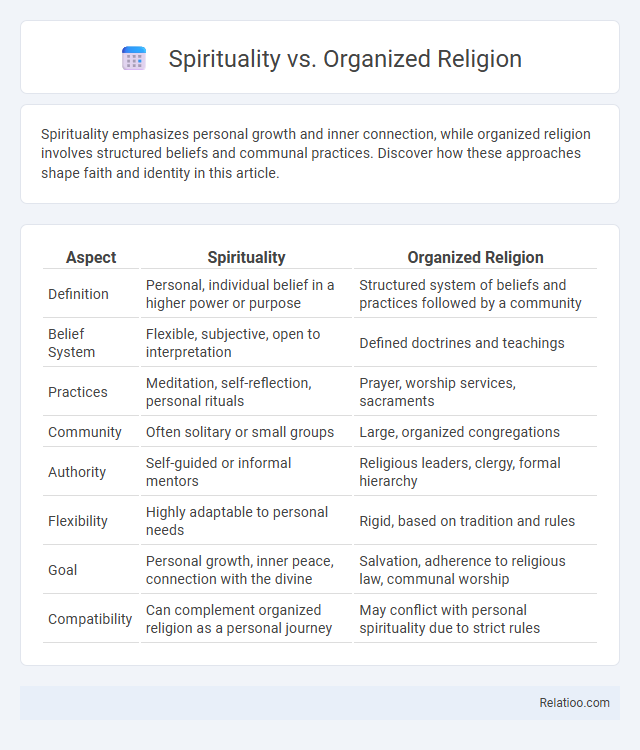Spirituality emphasizes personal growth and inner connection, while organized religion involves structured beliefs and communal practices. Discover how these approaches shape faith and identity in this article.
Table of Comparison
| Aspect | Spirituality | Organized Religion |
|---|---|---|
| Definition | Personal, individual belief in a higher power or purpose | Structured system of beliefs and practices followed by a community |
| Belief System | Flexible, subjective, open to interpretation | Defined doctrines and teachings |
| Practices | Meditation, self-reflection, personal rituals | Prayer, worship services, sacraments |
| Community | Often solitary or small groups | Large, organized congregations |
| Authority | Self-guided or informal mentors | Religious leaders, clergy, formal hierarchy |
| Flexibility | Highly adaptable to personal needs | Rigid, based on tradition and rules |
| Goal | Personal growth, inner peace, connection with the divine | Salvation, adherence to religious law, communal worship |
| Compatibility | Can complement organized religion as a personal journey | May conflict with personal spirituality due to strict rules |
Defining Spirituality and Organized Religion
Spirituality is an individual's personal quest for meaning, connection, and inner peace, often defined by subjective experiences and a sense of the sacred beyond formal doctrines. Organized religion consists of structured systems of beliefs, rituals, and institutional practices guided by established authorities and communal worship. Core belief serves as the foundational principles that shape both personal spirituality and the dogmas endorsed by organized religions.
Key Differences Between Spirituality and Religion
Spirituality emphasizes personal growth, inner peace, and direct connection with the divine, often without formal rituals or institutional frameworks. Organized religion relies on structured doctrines, communal worship, and established dogmas, providing a collective identity and moral guidelines. Core beliefs in spirituality tend to be fluid and individualized, whereas religion mandates adherence to specific creeds and practices that unify its followers.
Historical Roots of Organized Religion
Organized religion traces its historical roots to ancient civilizations where codified rituals and hierarchical institutions emerged to unify communities around shared spiritual narratives and moral codes. Core beliefs often originate from these traditions, shaping doctrines that guide followers' understanding of life, purpose, and the divine. Your exploration of spirituality may diverge from organized religion by focusing on personal, experiential connections rather than institutionalized practices.
The Personal Nature of Spirituality
Spirituality emphasizes your personal experience and individual connection with the divine or universe, distinct from the structured doctrines and rituals of organized religion. Core beliefs form the foundation of both spirituality and religion, but spirituality allows for fluidity and personal interpretation, reflecting your unique inner journey. This personal nature fosters a deeper sense of meaning and authenticity beyond institutional frameworks.
Community and Ritual in Organized Religion
Organized religion emphasizes community through shared rituals and collective worship, fostering a sense of belonging and unity among adherents. Spirituality often centers on personal experience and individual beliefs, whereas core beliefs in organized religion reinforce communal identity and moral frameworks. Rituals in organized religion serve as tangible expressions of faith that strengthen social bonds and maintain religious traditions.
Spirituality Outside Traditional Institutions
Spirituality outside traditional institutions emphasizes personal experiences, inner growth, and direct connection with the divine, contrasting with organized religion's structured doctrines, rituals, and communal worship. Core beliefs in individualized spirituality often center on universal values such as compassion, mindfulness, and interconnectedness without adherence to formal dogma. This approach fosters autonomy in spiritual practice, enabling seekers to explore diverse paths and develop a personalized sense of meaning and purpose beyond institutional boundaries.
Authority, Doctrine, and Dogma
Spirituality centers on personal experience and inner authority, allowing Your beliefs to evolve organically without strict adherence to external doctrines or dogmas. Organized religion relies heavily on established authority figures and codified doctrines that dictate specific beliefs and practices, reinforcing collective identity through dogma. Core belief forms the foundational truths that may intersect with both spirituality and religion but remain distinct by either embracing personal authority or institutional mandates.
Benefits and Drawbacks of Each Path
Spirituality offers personal growth and inner peace by fostering direct experiences with the divine, but it may lack communal support and structured guidance. Organized religion provides a defined belief system and community belonging, yet can impose rigid doctrines that limit individual interpretation and may lead to dogmatism. Your choice between these paths depends on whether you value personal freedom in belief or the stability and traditions of an established institution, each presenting unique benefits and drawbacks for spiritual fulfillment.
Intersections and Overlaps Between Spirituality and Religion
Spirituality and organized religion often intersect through shared core beliefs, rituals, and moral frameworks that guide individual and communal practices. Your spiritual journey may encompass personal experiences and inner growth while also aligning with the structure, traditions, and collective teachings found in religious institutions. Understanding these overlaps highlights how spirituality can thrive both within and outside formal religious boundaries, enriching your quest for meaning and connection.
Choosing Your Own Spiritual Journey
Choosing your own spiritual journey allows you to explore core beliefs deeply connected to personal values without the constraints of organized religion's doctrines. Spirituality emphasizes individual experience, inner growth, and a direct connection to higher consciousness, while organized religion often offers structured practices and community support. Align your beliefs with what resonates authentically to cultivate a meaningful and transformative path that nurtures your soul.

Infographic: Spirituality vs Organized Religion
 relatioo.com
relatioo.com